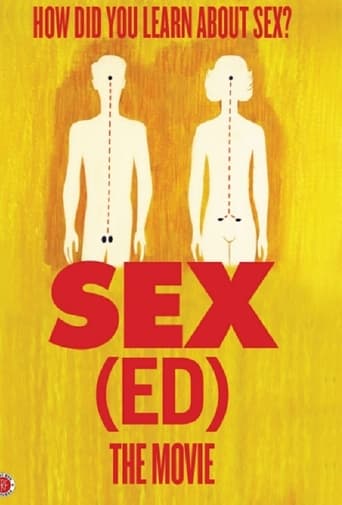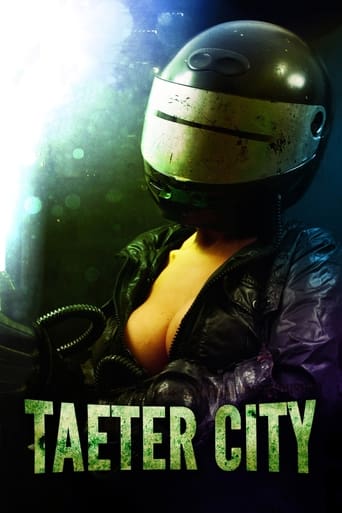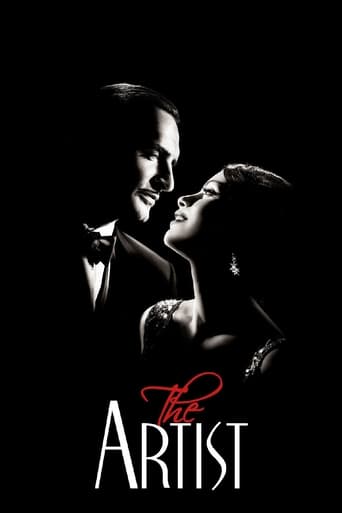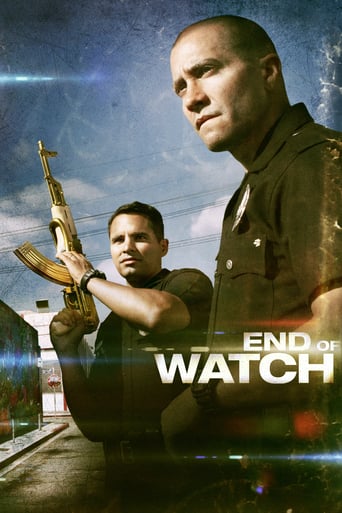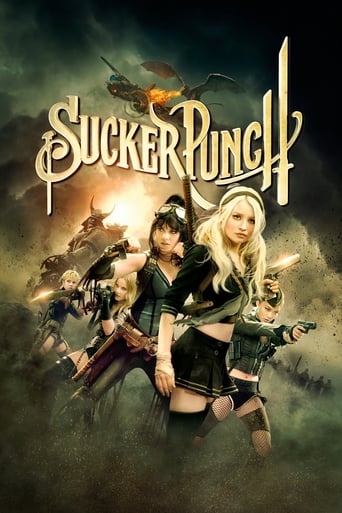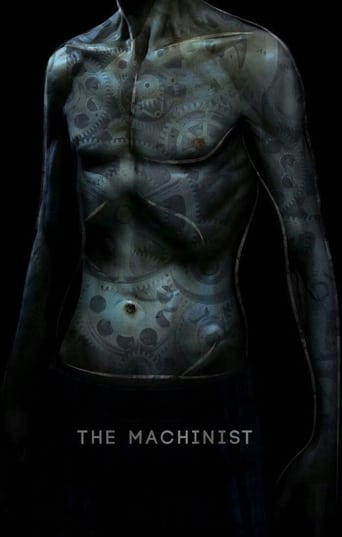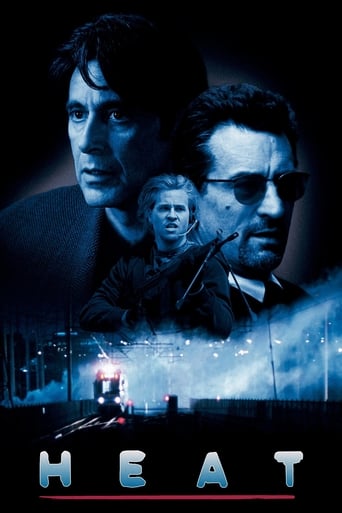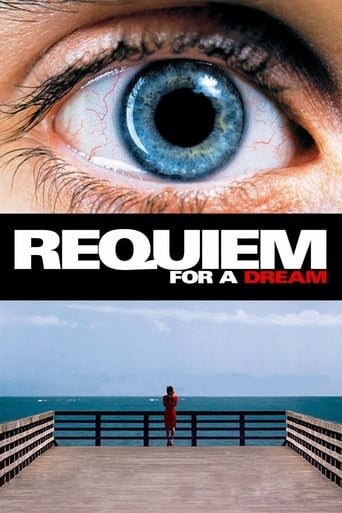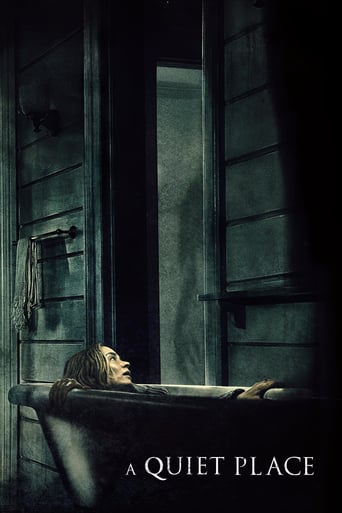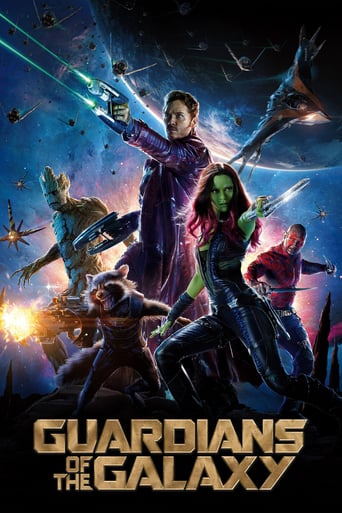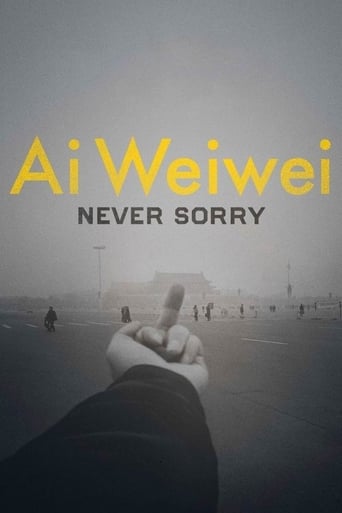


Ai Weiwei: Never Sorry
An account of the many tribulations that Chinese artist Ai Weiwei, known for his subversive art and political activism, endured between 2008 and 2011, from his rise to world fame via the Internet to his highly publicized arrest due to his frequent and daring confrontations with the Chinese authorities.
-
- Cast:
- Ai Weiwei , Chen Danqing , Hung Huang , Gu Changwei


Similar titles
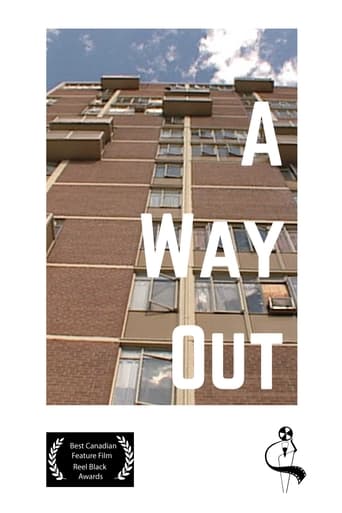
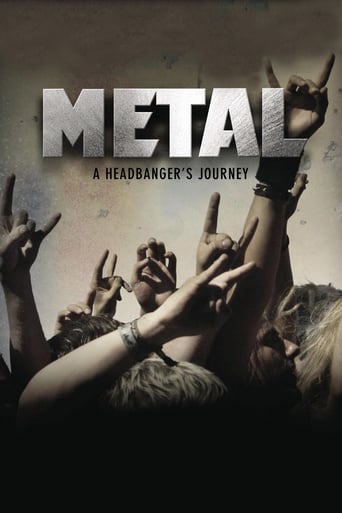
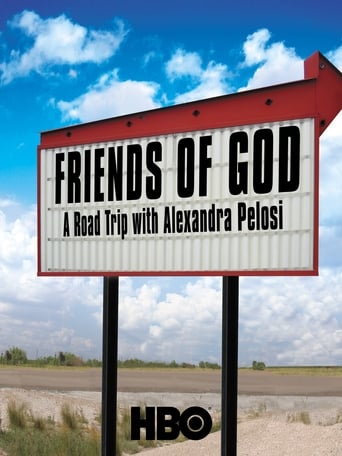
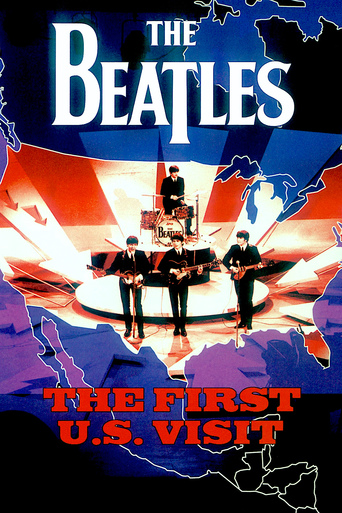

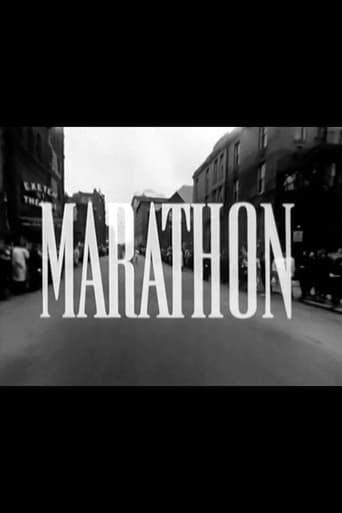
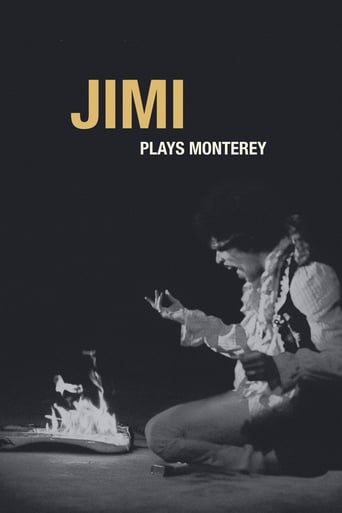
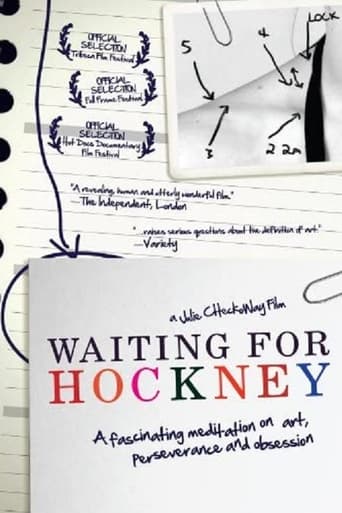
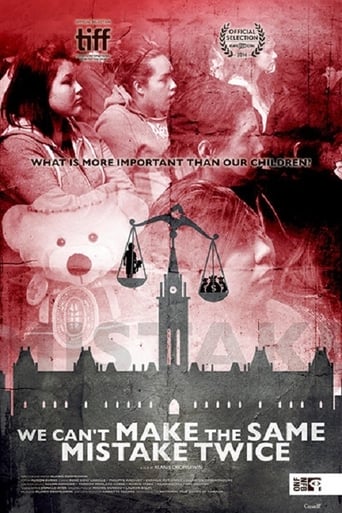
Reviews
Wow! Such a good movie.
Touches You
To me, this movie is perfection.
As Good As It Gets
For the things that people say . Sichuan appeared more or less I do not deny.But he saw only the problem,I hate , who has two sides.Two sides of things if you only care about the one hand, while ignoring the other hand , the result of the ability that you put it out is wrong.I'm sure at the people have not been to China , has been a long time have not been to China,See China in the with Decaying backward view.I can tell you , AI MO MO this man if he is in your country , you will hate .You in the West is very strong after the original capital accumulation , although China's rapid and stable development.But there is a great distance away from you,Western you with your concept of rules to measure the world has many years,Is he must be right !No, definitely not.You want the world to follow the development of your wishes , I can tell you , your power becomes increasingly weak.I can clearly tell you that your government spends much money to subvert the Chinese cause a lot of trouble to China every year, civilians die . A Soviet Union has been to topple , but China will not .We do not believe in God , we believe that our hands , I believe that the power of labor ; nor do we believe that your so-called democracy , we believe that our system . We may not be the best of peoples , but it is certainly an .Of course, some of us likeAI MO MO ,But they are small, can not keep us out into the future,Some of them will be forgotten , and some will always do nails like Jesus on the cross as shame was nailed in China. In a word, came to China to bring good meal time , in Post your comment
I must admit I knew virtually nothing about the Chinese dissident and artist Ai Weiwei before his detention and disappearance, in 2011, which made world headlines. This documentary, directed by Alison Klayman, does a fine job of capturing the life of Weiwei, who I found to be a very brave and charismatic figure. The film, I thought, was quite inspiring to me and also quite fascinating.The opening scenes show one of Weiwei's cats, who has learned to jump high and put his weight on a door handle and open the door, which is pretty amazing. Then Weiwei in his sly humor states that cats are different than humans because they have no inclination to close a door after they've opened it.His father was a renowned poet in China, but was sent into exile for re-education for 19 years. I imagine this is where Weiwei's iconoclastic spirit began. The movie traces his 12 years in New York City, where his brilliant art conceptions took root. When the crackdown in Tiananmen Square took place, in 1989, Weiwei participated in hunger strikes and demonstrations in protest. In 1993, he returned to China to be with his ailing father, who eventually passed away three years later.Most of the documentary focuses on Weiwei's continuing struggles to achieve more freedom for the Chinese people in a very authoritarian and controlled society. He seems to be in a continual struggle with the government, which shut his blog, surveilled his comings and goings, and even did nothing when security guards beat him in a hotel room, causing his brain to swell, nearly killing him.When the Sichuan earthquake struck China there were over 5,000 children killed, mostly from poor construction of schools, per the film. While the government wanted to keep the names of those who died secret, Weiwei began to identify all the children who died and had people from around the world read one name of each child on his Twitter page, to the consternation of the Chinese government.While some of his compatriots were imprisoned for speaking out against the authorities, such as Liu Xiaobo, Weiwei had escaped that fate. Many felt this was due to his worldwide notoriety, with his shows being so popular in many countries. However, in 2011, he was detained and for nine months held in seclusion. He was eventually released and apparently has slowly resumed his actions to achieve more freedom for the people there.The movie, I thought, was quite inspiring to me, and I found Weiwei's calm but revolutionary spirit to be quite special. The film also gives the viewers a seldom seen inside look at what's going on in China today.
Ai Weiwei is an internationally acclaimed Chinese artist-activist who is provocatively condemning his motherland government for grave social underbellies (in light of an unbalanced economy acceleration) as corruption nonfeasance and misfeasance among officials, systematic injustice, moral languor and freedom repression (a focal point is the aftermath of Wenchuan earthquake in 2008, whose casualties are over 80,000, among which are many children stayed inside shoddily-built school buildings) and valiantly spearheading (not the least in the artist field) a new wave of self-awakening among his fellow compatriots, which has promptly wrought government's mistreatment and investigations, all up to a somewhat "mysterious" disappearance during 2011 for half an year, then later ostensibly claimed by the Chinese government as a series of tax evasion interrogations of Ai's company, then subsequently Ai has been forbid to neither leave Beijing for one-year nor to speak about the matter. So if one is all familiar with the story, this documentary has rather little novel to offer, first- time director Alison Klayman covers a quite comprehensive range to introduce Ai's art, family and the (short but carefully-selected) comments from his friends and peers, but all falls short of incisiveness and compassion. The family card is an omnipotent weapon to probe a more personal facet of the artist himself (his illegitimate son has been briefly discussed here) which could induce empathy for every single viewer, however, this is a common-law generally fits under any similar context, the real Ai Weiwei is still elusive and taciturn. With such a contentious figure, Klayman seems to choose a very conservative story-telling which is exuding from a sheer westerner's point-of-view (a lone fighter against the all-evil oriental and dictatorial institution, surely the truth is much more intricate as we all know), still a shred of information betrays Ai's hooliganism in his own tactic, which would arise more interest (at least for myself). All in all, the film has attest to that Weiwei is a true artist (he is not exploiting all the controversies to grandstand his art work) if nothing else, and by the way, if anyone who is really into Ai's artwork, this documentary is not recommended for you unless you have never heard of his ground-breaking SUNFLOWER SEEDS exhibition.
"There are individuals who come along in certain periods of time who advance the human spirit to the next level." – actor James Newcomb Heroes are not only those who achieve unprecedented success, but those who create possibilities for others. "Breakthroughs" according to Werner Erhard, "are created by people who will act to make possibility real." Such an individual is Ai Weiwei (pronounced "Ay Way Way") a Chinese artist and political activist whom Time Magazine named as runner-up for "2011 Person of The Year." Directed by Alison Klayman, the compelling documentary Ai Weiwei: Never Sorry, winner of a Special Jury Prize at this year's Sundance Film Festival, follows Ai Weiwei pursuing his sculpture, architecture, curating, photography, film, and other arts in a political system that does not hesitate to use force, repression, and censorship against those they see as threats to the Communist government.Ai Weiwei's father was Chinese poet Ai Qing who was denounced and sent to a labor camp with his wife, Gao Ying, an event that had strong repercussions in Ai's life. Ai Weiwei lived in New York from 1983 to 1993 where he studied and worked as an artist. While in New York, he created conceptual art by altering ready-made objects. He also compiled 10,000 photographs that were shown in an exhibit at the Three Shadows Photography Art Centre in Beijing and became the subject of a 20-minute film "Who's Afraid of Ai Weiwei" shown on PBS in 2008, a work that was expanded to produce the current documentary.Using interviews with friends, family members, fellow artists, and young followers, Klayman describes Weiwei's involvement in the Sichuan Earthquake Names Project which listed the names of 5,000 student victims who lost their lives because of shoddy construction of schools, his criticism of the government's use of propaganda to support the Beijing Olympics whose Bird's Nest Stadium he helped to design, and his provocative use of humor in his exhibit using photographs showing his extended middle-finger in front of Tiananmen Square. Weiwei says, "There is no outdoor sport as graceful as throwing stones at a dictatorship." The film also documents the artist's exhibitions in Munich, especially a work called "Remembering" which displayed 9,000 backpacks spelling out the words "She lived happily on this earth for 7 years," a reference to students who were killed in the Sichuan earthquake. Another exhibit shown at the Tate Gallery in London consists of 100-million porcelain hand-painted sunflower seeds made in China. Though China claims that human rights have improved in their country, Ai Weiwei's assault by police thugs attempting to prevent him from testifying at the trial of Tan Zuoren belies the claim. Zuoren, an activist and recent Nobel Peace Prize winner, was sentenced to 11 years in prison for several articles that, according to Weiwei, were reasonable and not at all provocative.One of the most important aspects of Weiwei's activism is his use of social media, especially Twitter (@aiww), an activity that he began in earnest after his blog was taken down by the authorities. This is demonstrated by his ability to quickly organize resistance to the government's proposed demolition of his newly-built art studio in Shanghai which they deemed "illegal." Though the documentary breaks no new ground as an art form and only skims the surface of Ai's personal life, Ai Weiwei: Never Sorry is a well-made and often inspiring film about an artist who is willing to take enormous risks for his own safety to expose human rights abuses and which reaches a new level of intensity when it is discovered that Weiwei has disappeared, leading to world-wide protests and an uncertain outcome.

